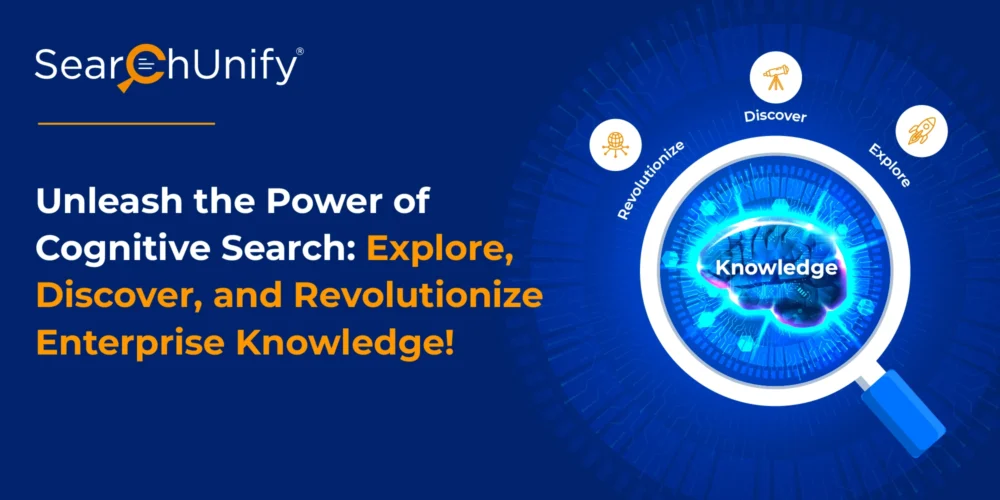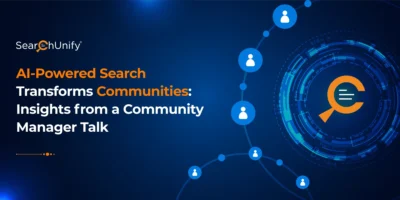
In the vast expanse of the digital universe, where data swirls like distant galaxies, enterprises stand at the precipice of a cosmic revelation. As they grapple with the overwhelming chaos of information, organizations seek a solution beyond traditional enterprise search.
Enter Cognitive Search! It is a revolutionary technology that is transforming information exploration and discovery expeditiously.
In this blog post, we embark on a journey to understand cognitive search. Join us to understand its power and potential to shape the future of businesses and enterprise search.
What is Cognitive Search?
Cognitive search is an advanced search technology that uses artificial intelligence and natural language processing to understand, analyze, and retrieve relevant information from vast amounts of structured and unstructured data sources, enabling users to find insights and answers more efficiently.
It, therefore, has the potential to revolutionize information retrieval and provide organizations with valuable insights. However, successful implementation requires careful planning and execution.
So, how to nail it? Read to know more.
Ensuring Success in Cognitive Search Implementation
Here are some pointers to consider when implementing cognitive search to ensure a successful outcome:
1. Data Preparation and Indexing
To implement cognitive search effectively, organizations need to invest in data preparation and indexing strategies that lay a solid foundation for efficient search operations. These include:
a) Data Cleansing
Before embarking on a cognitive search implementation, it is essential to ensure data accuracy and integrity. Data cleansing techniques, such as duplication and data normalization, help eliminate redundancies, inconsistencies, and errors that could hinder search performance.
b) Metadata Extraction
Extracting metadata, such as author, date, and keywords, from documents and other data sources, enriches the search experience. Metadata provides additional context and improves searchability, enabling users to locate relevant information more effectively.
c) Document Indexing
Creating an efficient and scalable index structure is crucial for quick retrieval and navigation. For this organizations can leverage search engines, graph databases, or distributed file systems. Doing so will help facilitate seamless search experiences.
2. Configuration and Tuning
The second key consideration for organizations to ensure a successful cognitive search process is configuration and tuning. It includes:
- Right Search Solution: Select a cognitive search platform that aligns with your specific requirements and use cases. Consider factors such as scalability, natural language processing capabilities, support for multiple data sources, etc. Here’s a quick guide on choosing the right enterprise search vendor.
- Query Understanding: Enhance the cognitive search system’s understanding of user queries by incorporating NLP techniques such as entity recognition, query expansion, sentiment analysis, etc. This will help the system provide more accurate and relevant search results.
- Feedback Mechanisms: Incorporate feedback mechanisms to capture user interactions and preferences. Analyze user behavior, search patterns, and feedback to continuously improve the cognitive search system.
3. Evaluation and Iteration
Last but not least consideration is the final evaluation. Here are a few measures that need to be taken into account while evaluating:
- Evaluation Metrics: Establish evaluation metrics to measure the effectiveness and performance of the cognitive search implementation. These include precision, recall, click-through rates, user satisfaction, or time to find information. Regularly monitor and evaluate these metrics to identify areas for improvement and track the system’s progress.
- User Training and Support: Ensure that users are trained on how to effectively use the cognitive search system and understand its capabilities. Provide documentation, tutorials, or training sessions to help users make the most of the system’s features. Additionally, offer ongoing support to address any questions or issues that users may encounter.
- Latest Advancements: Keep abreast of the latest advancements in cognitive search technologies and practices like Federated Retrieval and Generation, Large Language Models, etc. Attend industry conferences, participate in relevant communities, and follow thought leaders in the field. This will enable you to leverage new techniques and approaches that can further enhance the success of your cognitive search implementation.
Now that we are done with the implementation, here are a few tips and tricks to make your cognitive search experience even more seamless.
Cognitive Search Tips and Tricks
Deploying a cognitive search mechanism will help unlock the true potential of vast data repositories. Wondering how? By using the following capabilities:
1. Contextual Recommendations
Cognitive search has the ability to provide personalized recommendations based on user behavior and preferences, promoting knowledge discovery and collaboration. This includes the following techniques:
a) Collaborative Filtering
By analyzing user behavior, cognitive search systems can identify patterns and parallelism among users with similar interests. This collaborative filtering approach enables the system to suggest relevant content that other users in similar roles or with similar preferences have found valuable. For example, a support manager searching for a solution to a specific technical issue may receive recommendations for articles or resources that have been highly rated by other support managers who faced similar challenges.
b) Content Similarity
Cognitive search algorithms can analyze the content of documents to identify related resources that may not have been explicitly linked. By understanding the similarity in content, the system can suggest additional relevant documents, helping support managers and knowledge managers explore a broader range of information. For instance, when a knowledge manager creates a new article on “customer onboarding best practices,” the system recommends similar articles on related topics, such as “customer retention strategies” or “customer satisfaction surveys.”
2. Augmented Analytics
Cognitive search platforms provide capabilities for augmented analytics, empowering support and knowledge managers to extract actionable insights from vast amounts of data.
a) Automated Insights
By applying ML algorithms, cognitive search systems can automatically analyze data and generate insights. For support managers, this means gaining a deeper understanding and uncovering trends within customer support tickets, leading to more effective strategies for issue resolution. Similarly, knowledge managers can identify gaps in knowledge bases or areas that require updates, ensuring that resources remain up-to-date and relevant using automated insights.
b) Trend Analysis
Cognitive search platforms can analyze historical data and identify patterns and trends. This allows support and knowledge managers to detect emerging issues, anticipate customer needs, and proactively address them.
For example, by analyzing customer feedback, support managers may discover a rising trend of complaints related to a specific product feature. Armed with this knowledge, they can initiate appropriate actions, such as conducting targeted training for support agents or addressing the issue through product improvements.
To Conclude
Cognitive search is not just a technology; it is a gateway to a future where information is readily accessible, insights are at our fingertips, and knowledge fuels innovation. Support and knowledge managers who embrace cognitive search today will lead the charge in creating a smarter, more efficient, and more connected enterprise ecosystem, where the boundaries of knowledge are expanded and the possibilities are limitless. So, are you ready to embark on this transformative journey and unleash the power of cognitive search to shape the future of enterprise knowledge discovery?
Request a demo today!



















